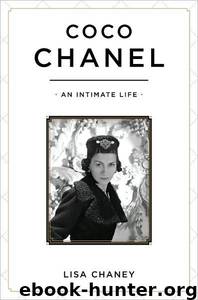Coco Chanel: An Intimate Life by Lisa Chaney

Author:Lisa Chaney
Language: eng
Format: mobi, epub
Tags: Art, Biography
ISBN: 9780670023097
Publisher: Viking Adult
Published: 2011-11-10T00:00:00+00:00
In that same year, 1924, Gabrielle was once again asked by Cocteau to design the costumes for a new Ballets Russes production, Le Train Bleu, whose inception arose out of a Diaghilev fit of pique. Following the death of Radiguet, Cocteau had gone to Monte Carlo to find distraction with his musical friends Stravinsky, Poulenc and Auric. Whatever the histrionics, Cocteau was genuinely prostrate at the death of his youthful amour and would take years to recover from it.
In Monte Carlo was the music critic Louis Laloy, a man of great cultivation who was also addicted to opium. In 1913, his notorious Le livre de la fumée, a history and manual of opium smoking, was credited with the great popularity of its practice in postwar Europe. Cocteau would write, “My nervous suffering became so great, so overwhelming, that Laloy at Monte Carlo suggested I relieve it in this way,”6 and so, with Poulenc, Auric and Laloy, he began smoking in earnest. By the time he left Monte Carlo a few weeks later, he was hooked, and in the future he would at times be reduced to an appalling state by his addiction. While Gabrielle would complain about Cocteau, she also remained his supporter, paying on several occasions for his rehabilitation. It is worth bearing in mind here the opinion of a present-day expert in drug addiction: “Addiction beginning in one’s mid-thirties [Cocteau’s age], or thereafter, is not a search for excitement or pleasure, as in the very young.” Cocteau was not out for kicks; he was desperate to escape the depths of his depression.
The ballet Le Train Bleu came about initially as compensation for Cocteau’s involvement in a contretemps between Diaghilev and the ambitious and flirtatious Ukrainian dancer Serge Lifar, who had stepped out of line. The ballet was set at a resort and became a vehicle for the extraordinary gymnastic antics of Diaghilev’s present lover, a young Englishman named Anton Dolin (real name Patrick Kay). Cocteau’s thin story line had Dolin impressing a troupe of golf and tennis players and featured beach belles of both sexes who were all in search of adventure.
With a score from Darius Milhaud, choreography was to be by Nijinsky’s dour but gifted sister, Bronislava Nijinska; set designs were by the cubist sculptor Henri Laurens, and costumes were by Gabrielle. Laurens’s Riviera beach set of sloping cubist planes and lopsided beach huts was in natural hues, dramatically setting off Gabrielle’s costumes in bright dynamic colors.
Diaghilev didn’t like Laurens’s front curtain. And remembering that in Picasso’s chaotic studio he had seen a canvas of the now-famous giant women, hand in hand, bare breasted and running across a beach, he set out to acquire it. Diaghilev loved the earthy abandon of these women, and his majestic powers of persuasion overcame even the wily and stubborn Picasso. Diaghilev was so pleased with this painting that a brilliantly enlarged version—painted by the Russian émigré prince Shervashidze—was used as the Ballets Russes front cloth from then on.
The train to which the ballet refers was then the ultimate in chic.
Download
This site does not store any files on its server. We only index and link to content provided by other sites. Please contact the content providers to delete copyright contents if any and email us, we'll remove relevant links or contents immediately.
| Actors & Entertainers | Artists, Architects & Photographers |
| Authors | Composers & Musicians |
| Dancers | Movie Directors |
| Television Performers | Theatre |
Cecilia; Or, Memoirs of an Heiress — Volume 2 by Fanny Burney(31935)
Cecilia; Or, Memoirs of an Heiress — Volume 3 by Fanny Burney(31925)
Fanny Burney by Claire Harman(26591)
We're Going to Need More Wine by Gabrielle Union(19032)
Plagued by Fire by Paul Hendrickson(17401)
All the Missing Girls by Megan Miranda(15925)
Cat's cradle by Kurt Vonnegut(15324)
Bombshells: Glamour Girls of a Lifetime by Sullivan Steve(14046)
For the Love of Europe by Rick Steves(13866)
Leonardo da Vinci by Walter Isaacson(13306)
4 3 2 1: A Novel by Paul Auster(12363)
The remains of the day by Kazuo Ishiguro(8965)
Adultolescence by Gabbie Hanna(8909)
Note to Self by Connor Franta(7663)
Diary of a Player by Brad Paisley(7551)
Giovanni's Room by James Baldwin(7316)
What Does This Button Do? by Bruce Dickinson(6194)
Ego Is the Enemy by Ryan Holiday(5411)
Born a Crime by Trevor Noah(5368)
